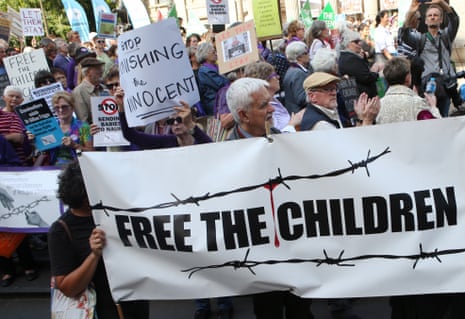Children are damaged by immigration detention and “wherever possible” they should be removed from it, the immigration department’s head doctor has told parliament.
The chief medical officer and surgeon general of the Australian Border Force, Dr John Brayley, appeared before Senate estimates on Monday morning, telling the hearing detention was harmful to children.
“The scientific evidence is that detention affects the mental state of children, it’s deleterious,” he said. “Wherever possible, children should not be in detention.”
More than 72 children now in Australia – including 37 babies born in Australia to asylum seeker mothers – face being removed to Nauru after the high court’s decision in the M68 case upholding the constitutionality of the government’s offshore detention regime. Brayley was asked whether children suffering depression, anxiety, or post-traumatic stress disorder should be returned to Nauru.
“What we can say is that for a child with those conditions ... being in detention is not the right place for a child and every step needs to be taken to remove a child from detention,” he said.
The government has consistently maintained that since the Nauru detention centre became “open” in October, with asylum seekers and refugees able to leave and return the centre when they choose, nobody on Nauru is “in detention” anymore.
However, a Senate inquiry earlier found that all asylum seeker children should be removed from the Nauru centre because it was “not well run”, the department did not know what was happening in the centre it was running and children were not safe there.
Brayley told estimates a series of mental health tools had found significant issues among children in detention onshore and offshore, but that the figure needed to be seen “in the context of the government and the department’s concerted efforts to remove children from detention”.
The department has assessed the mental health of children in immigration detention onshore and offshore, using the Strengths and Difficulties questionnaire (SDQ) that is completed by parents and children. The survey assesses – through 25 questions – emotional symptoms, conduct problems, hyperactivity and peer relationships.
Of 45 children aged under 11 in four onshore detention centres, 67% were rated by their parents as displaying abnormal behaviour. Of 18 older children who completed the survey themselves, 33% self-reported abnormal behaviour and 22% borderline abnormal.
On Nauru, 71% of young children were found by their parents to display abnormal behaviour. Sixteen per cent of older children self-assessed abnormal behaviour and 25% borderline abnormal.
On the disparity between parents and children’s assessments it is widely recognised, Brayley said, “that parents will identify problems that children themselves won’t identify”.
The rate of abnormal behaviour is significantly higher than community levels. The SDQ was designed so that about 10% of children and adolescents would fall into the “abnormal” range on the total difficulties score, the Australian government’s survey of child and adolescent mental health says.
The elevated mental health problems highlighted by the SDQ accord with other health data from Australia’s immigration detention network.
Last month, Guardian Australia revealed internal departmental documents that show people held in immigration detention have rates of severe mental distress nearly four times the general population in Australia, according to the government’s own detention health services provider.
The documents also warn the government that children in detention suffer more serious mental health crises than adults, that their mental health deteriorates the longer they are detained and that detention causes children long-term mental health damage that will persist long after they are released.
The secretary of the Department of Immigration and Border Protection, Mike Pezzullo, told estimates it was the government’s policy “to do whatever possible within the ambit of the policy to get children out of detention”.
There are far fewer children in detention now – 91 – than at the peak of child detention in July 2013, when 1,992 children were detained. Sixty-eight children live in the detention centre on Nauru and about 80 outside the detention on that island.
However, the average time in detention has dramatically increased over the past four years, from an average of 72 days in July 2013 to 445 days last month.
Nearly a quarter – 23.5% – of people in immigration detention have been incarcerated for more than two years.
